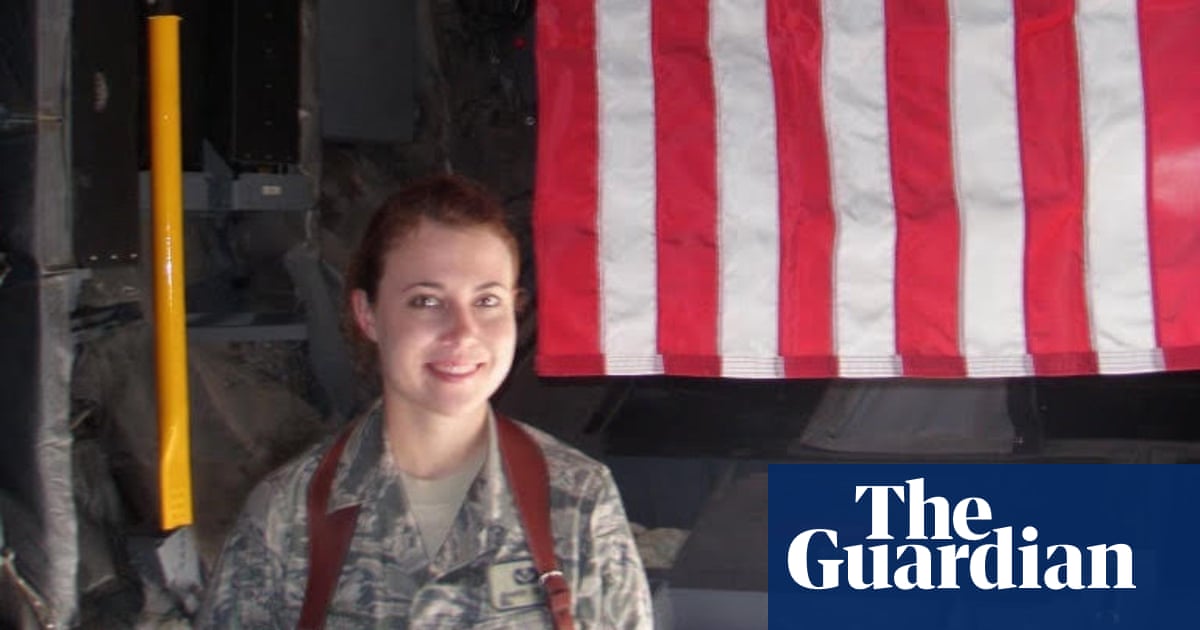
Show caption Neither Jen Burch’s assault nor her PTSD were taken seriously. Photograph: Courtesy Jen Burch/Handout Post-traumatic stress disorder Invisible and unheard: how female veterans suffering trauma are let down by US healthcare Women suffer PTSD at twice the rate of men yet their symptoms and stories are often overlooked Rose Empson Tue 28 Dec 2021 10.00 GMT Share on Facebook
Share on Twitter
Share via Email
For Felicia Merkel, the PTSD trigger is any loud sound – an overhead speaker, a slammed car door – transporting her back to the blistering heat of Afghanistan. For Liz Hensel, it is looking into her daughter’s chestnut brown eyes, their color reminding her of those of a young Afghan girl named Medina, who lost her mother and leg at the trauma hospital in Kandahar. For Jen Burch, the intrusive memory is of the man who assaulted her before she deployed.
More than a decade has passed since these three women were deployed to Afghanistan. It’s now almost four months since the US military withdrew from Kabul on 30 August. Still, specific memories consume them. Three hundred thousand female veterans served in the 19-year war, and as media coverage dwindles and the nation slowly forgets, Felicia, Liz and Jen continue to remember.
Their experiences in Afghanistan differed from those of the male soldiers with whom they served. Now, their stateside lives do too. Being a woman in war comes with its own set of distinct traumas. While congressional legislation that has recently been proposed is welcome, essential bills are still being blocked that would help repair the suffering these women have endured for years.
Gender differences exist in trauma exposure. PTSD is twice as common in women than in men, according to a study conducted by Kathryn Magruder at the University of South Carolina.
Yet they face additional obstacles when seeking support after their deployment.
The Deborah Sampson Act passed in January of this year made gender-specific services available at veteran medical centers across the country.
However, on 6 December, House and Senate armed service committee leaders tried to block the Military Justice Improvement and Increasing Prevention Act, which would enable veterans to report sexual assault to a neutral third party.
***
Felicia’s husband says she is a lot jumpier now than she used to be. Talking about Afghanistan makes her sad, but as she has gotten older, sounds, not memories, trigger her PTSD. The anxiety hits. She breathes deeply. Then tries, with difficulty, to get her heart rate down.
Felicia Merkel could not shake the memories of the deaths she witnessed. Photograph: Courtesy Felicia Merkel/Handout
It was December 2010, the year of her first deployment. She was lying in bed at the base at Kandahar, watching American television, when she heard those crashing bumps. Seconds later, the sirens sounded. A rocket had hit. Felicia fell to the floor with a thud and ran for the nearby bunker.
It was cold and dusty in there; a dirt track enveloped in a hollow concrete shell. Just feet away, medics worked on a man wounded in the chest; he had no pulse in his left leg. They called for clothing, anything that might be used to stop the bleeding. As the yells of the medics got louder, Felicia’s mind traveled further away.
She couldn’t do anything to help. Eleven years later, she still feels that guilt and hears those sounds.
She had arrived in Kandahar energetic and excited. She returned to Minnesota a year later, distant and dejected. The months after coming home were the worst. Gritting her teeth through weekly therapy sessions, she insisted that everything was fine. The therapist believed her, even telling her not to come back.
On 4 January 2012, Felicia tried to kill herself. She began with a single antidepressant. Then she took five more. Then the bottle. None of her co-workers, family or friends knew about her clinical depression. She spent her 22nd birthday in intensive care.
Post-military support at the time, she maintains, was significantly lacking.
“Female service members have much more to deal with in the complexity of trauma,” confirmed Jennifer Pacanowski, founder of the non-profit Women’s Veterans Empowered and Thriving. “They also have less access to services, which are not as specialized to their needs as those available to male veterans.”
The Deborah Samson Act, a bipartisan bill passed by the Senate in January 2021, will establish a policy to end gender-based sexual harassment and assault by training employees and providing legal services for veterans at risk. It will also staff Veteran Affairs facilities with a permanent female health provider.
Felicia wishes she had access to these sorts of resources when she came home. Instead, during a 10-minute evaluation, it was determined she did not have PTSD, and that her grief stemmed only from her mother’s death.
She was furious and felt unheard.
Looking back, she believes that better healthcare policies for female veterans would have encouraged her to open up about her experiences and struggles sooner. Instead, she dealt with her feelings alone until she needed life-saving help.
***
After deploying in August 2010, Liz began volunteering at Kandahar’s trauma hospital. She had already witnessed death. Just weeks earlier, an injured soldier died with his head resting on her stomach. She dealt with this like any Marine had to do in any high-intensity combat situation: turn off emotion and focus.
She could not, however, turn off the memories of the trauma hospital. As the mother of two young daughters, it tugged at every maternal instinct she had.
American male service members were not permitted to work at the hospitals. Only because she was female could she see what she now can’t forget.
The waiting room that November day was bustling with uncles, fathers, cousins and brothers.
No one waited for Medina. Whoever brought the three-year-old Afghani girl had left. Her infected foot could not be saved, and Liz cradled the child as she came out of the anesthesia after the amputation. Rather than waking in familiar arms, Medina’s first sight was this stranger wearing desert camouflage with a pistol at her side. The anguish Liz felt reminded her that she could feel again after months surrounded by death.
Liz Hensel thinks about Medina when she looks at photos of her own daughter. Photograph: Courtesy Liz Hensel/Handout
Now, Medina revisits Liz’s thoughts back in Virginia. She appears in flashbacks when Liz looks at baby photographs of her youngest daughter. She comes to mind when Veterans Day is celebrated on national television.
Was the girl still alive? Could Liz have done more to help her? Was she attending school amid the Taliban’s ever-increasing restrictions on women’s freedom?
Liz had flown to Afghanistan fearless and determined in 2010 but returned to the US four months later, injured and traumatized.
In the weeks after her deployment, Liz felt as if she were watching someone else’s life in a movie. Physically, she was home, but mentally, she was in Kandahar.
She tried going through the motions expected of her as a mother and a wife. Doing menial tasks – cooking dinner, hugging her child – things she had been so capable of doing before she left. But it felt to her like a tug of war, the past pulling her back, her mind fighting to remain present.
It didn’t help that she felt her pain was invisible to the world. When attending Veterans Affairs medical appointments, the administration staff would sometimes ask her husband, who came along for support, who he was there to see. He would have to correct them and say the appointment was for his wife.
It was only when they took the time to listen to Liz’s story that people validated her trauma. Research shows that post-traumatic stress in veterans varies by gender. If hers had been recognized earlier, she wonders, would she still be struggling with it 11 years later?
***
Jen, like Liz, was working in Afghani hospitals because she was a woman. She, too, was haunted by a girl who had lost a foot. But, more, she was haunted by the long-term impacts of sexism and abuse in the military.
Jen was sexually assaulted by her supervisor at a US military base, months before she was deployed to Afghanistan in 2010.
She was made to report it through her chain of command, but was quickly stopped in her tracks. Everyone loved the man she was accusing.
“We’re so glad to have him back,” said the male officer who handled her complaint.
Jen wanted to deploy abroad. She knew no one would believe her. So she stopped, fearing that as a victim, she would be isolated.
But trauma builds on trauma. This experience made Jen more vulnerable to the horrors she witnessed during her service in Afghanistan. Statistically, a history of sexual assault puts a veteran at higher risk for developing PTSD.
Serving at Buckley Space Force Base in Denver, Colorado, when she returned stateside from August 2011 to 2014, things got worse.
Jen started to go through some of the lowest moments of her life.
Her co-workers assumed that she was being emotional about things because she was a woman. Someone she served with in Afghanistan observed that the only PTSD she had was from eating the bad food. This went on for a year and a half.
Jen was assaulted before she arrived in Afghanistan. She worked overtime in the trauma hospital doing mortuary affairs; developed breathing problems; had glass nodules in her lungs. Yet she was perpetually made fun of. It was a very negative culture surrounding her post-deployment.
No one wanted to hear her story.
Although women are the fastest-growing veteran demographic, she believes that some men still don’t think of women serving in roles of high stress or exposure.
Currently, the Military Justice Improvement and Increasing Prevention Act is being blocked. If the act had been passed when Jen was on active service, she would have reported her sexual assault.
This is the same for many other women in the military, she believes. And while there is a mountain of legislation being passed to assist female veterans, this is still not enough.
“If it means sharing the darkest details of my story, then I’ll keep doing this,” Jen said, “until the gendered gap in veteran healthcare is finally closed”.






